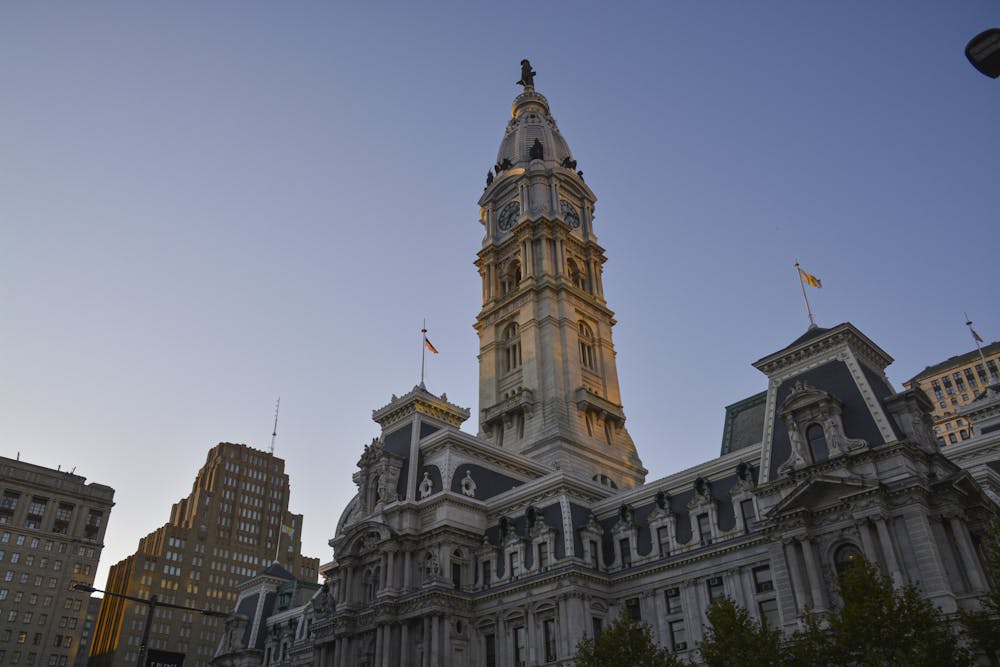
City Council recently introduced their Reparations Task Force members.
Credit: Kylie Cooper
The Philadelphia City Council introduced the nine members of its Philadelphia Reparations Task Force in May.
The task force, which is co-chaired by Breanna Moore, a Ph.D. candidate in history at Penn, aims to “stud[y] and develop … reparations proposals and programs for Black Philadelphians whose ancestors endured chattel slavery and Jim Crow in the United States,” according to the city council’s website. The task force was initially proposed before Juneteenth in 2023 by Councilmembers Kendra Brooks and Jamie Gauthier, the latter of whom represents the third district of Philadelphia, which includes Penn. The proposal passed unanimously.
“The task force will provide the City of Philadelphia, the Commonwealth of Pennsylvania, and the United States of America with a report on how reparations can atone for the legacy of slavery, Jim Crow, and institutional racism in America for Black Philadelphians, as well as what reparations could look like,” Gauthier wrote in a statement to The Daily Pennsylvanian. “The vision of the task force is to elevate and protect the full human rights and human potential of Black Philadelphia in real-time.”
Moore echoed Gauthier’s sentiments, saying that the task force will examine the negative consequences of slavery, examples of “how those harms have manifested to [the] present day,” and “offering repair in the form of reparations.”
Moore added that the task force will try to “offer repair[s] in the form of reparations — recommendations and proposals — to try, to not only alleviate some of those harms, but completely eradicate them, and really make the lives of Black Philadelphians better.”
The task force is currently comprised of nine members, including two co-chairs and several individuals focusing on specific issues related to reparations, ranging from economic justice to education reform.
Moore noted that a large driving force behind the task force was N’COBRA, the National Coalition of Blacks for Reparations in America, with which she used to be involved. Cara McClellan, the criminal and legal justice system coordinator on the task force and associate professor at the University of Pennsylvania Carey Law School, echoed this.
“There’s a Philadelphia chapter of N’COBRA, and [it and City Council] worked together to then pass a resolution that would actually authorize the task force to exist — it got unanimous approval from City Council — and so then they began seeking applications and putting together a task force,” McClellan said. “I was contacted and interviewed with the organizers for the criminal and legal justice system position and, you know, it kind of aligned with my interests and expertise. So I agreed to join the task force.”
McClellan described her role on the task force as being a “coordinator or connector of different people who really know a lot about the criminal and legal justice system in Philadelphia to come together to do this research and to come up with recommendations.”
Gauthier seconded this emphasis on the community, writing that “City Council authorized the Philadelphia Reparations Task Force, but its members and leadership are Philadelphians from the descendant group.”
Moore also detailed her duties as co-chair, which center around drawing engagement and speaking to as many people as possible about how to execute the task force’s goals. She emphasized that the task force’s actions to pursue reparations will come from “the people of Philadelphia, in alignment with what the task force researches,” noting that before any action occurs, the task force hopes to “actually start surveying the community for them to offer up what those recommendations [of how to pursue reparations] will be.”
With regard to the purpose of the task force, Gauthier wrote that she “created the Philadelphia Reparations Task Force to reckon with American slavery’s lingering impact on the Black community.”
“Until we look into our past with the determination to uncover the entire truth — no matter how ugly or scary that truth may be — our nation’s original sin will continue to toxify the present and future,” she wrote.
Moore also noted that part of the motivation for the task force came from what she referred to as Philadelphia’s lack of complicity with the ordinance pertaining to disclosures of slavery, which was passed in 2005 and “requires any financial depositories … that are doing business in the city of Philadelphia to disclose if they or their predecessors profited from slavery.”
The task force is holding a town hall meeting on June 29 from 11 a.m. to 2 p.m. at 4308 Woodland Ave. in room 145 of St. Joseph’s University’s McNeil Science and Technology Center.
The Daily Pennsylvanian is an independent, student-run newspaper. Please consider making a donation to support the coverage that shapes the University. Your generosity ensures a future of strong journalism at Penn.


